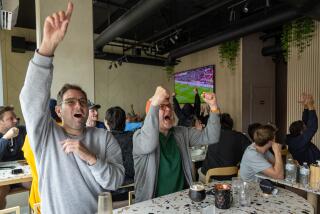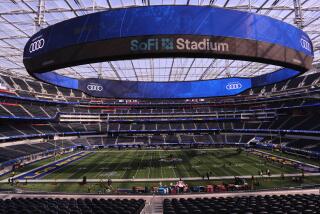Test of Time
- Share via
YOKOHAMA, Japan — The English have a word for it: “skiving.” Loosely defined, it is the act of avoiding serious activity--shirking work, skipping an assignment, calling in sick.
During the month of June, as England’s national soccer team pursues the World Cup in a land and a time zone far, far away, skiving will become England’s national pastime.
With an eight-hour time difference separating England from Japan, matches played at 3:30 p.m. and 8:30 p.m. in the Far East will start at 7:30 a.m. and 12:30 p.m. in England. This presents a dilemma for English businesses, as evidenced by a recent Barclaycard survey that estimated that 40% of the nation’s soccer fans will be skiving off work in order to watch England and Ireland matches.
The survey also estimated that such wide-scale skiving will cost the England economy as much as 3.2 billion pounds.
Umbro, the English sporting goods company that manufactures the national team’s uniforms, is encouraging the burgeoning army of truants with a wink and nudge, offering fans a “bunk-off” Web site that includes a very proper-looking doctor’s sick note that can be printed, filled out and handed to the boss.
The word is out, and with the World Cup set to open Friday, employers across the country have made preparations.
Peterborough.net, a U.K. business Web site, offers the following advice for British companies and corporations:
“Most of the matches take place in the morning U.K. time. Firms should be aware of this, particularly on the 7th June, when England play Argentina. This match takes place at 12:30 p.m. U.K. time, and there is the possibility, however slight, that employees may try to call in sick on that day, or simply not turn up for work, so they can watch the match at home on television.”
Fashioning a World Cup game plan, the site suggested that employers allow their staff to start their shifts later during the World Cup and either work later or make up the time after the tournament. It also advised allowing employees extended lunch breaks or bringing a big-screen television into the office.
“If you choose this option,” the site cautioned, “bear in mind that with breaks etc., the game could stretch more than two hours.”
England’s first match, against Sweden, is Sunday, kicking off at 10:30 a.m. U.K. time. The Church of England, realizing that soccer is a religion unto itself, sent an e-mail to dioceses throughout the country advising they arrange to televise the game for parishioners and also approved changing the time of services.
So St. James’ Church in Clerkenwell, London, will screen the game and cut short its customary Sunday services to make way for St. Michael Owen. The church also will allow parishioners to bring their own beer.
“It is part of our way to show Christians are not complete weirdos who sit in the monastery and never have any fun,” vicar Andrew Baughen told National Public Radio.
Smoking, swearing and verbal abuse of the opposition will not be allowed, however, according to the vicar.
Churches in England will be competing for attendance with pubs and restaurants, which have been granted permission by the High Court to open and begin selling alcohol at 7 a.m. during the World Cup.
Acting on a petition by a Bristol pub owner challenging the country’s existing laws that pubs not serve alcohol until the afternoon, Lord Woolf, the Lord Chief Justice, ruled in April that “If one were to ask anyone today whether the World Cup was a national special event, I apprehend that the reaction would be immediate, that it was such an event. The customers are going to the public house ... to take part in a collective enjoyment of the event.
“Spectators can obtain the satisfaction of being involved as collective participants in what is happening many thousands of miles away.”
About 8,000 miles away, in fact.
So far away that in March, a group of soccer fans in Ireland circulated a petition urging Prime Minister Bertie Ahern to move clocks forward by nine hours during the World Cup so that Ireland would be on Japan time.
The Give Us Back Our World Cup campaign collected more than 5,000 signatures calling for the time change, which, if enacted, would have had Irish workers punching time clocks at 4 in the morning.
“I don’t think that’s a whole lot to ask,” Irish Times sportswriter Mary Hannigan said on NPR. “It’s only a month.”
Getting up for a 7:30 a.m. kickoff, Hannigan said, “is just an unreasonable time, really, for Irish soccer fans to get up and watch their football. See, there’s a tradition here. We go to the pub, and we all gather maybe two hours before kickoff. We all drink a few pints of Guinness or whatever’s on offer. We all get happy and merry and get ready for the big game.
“It kicks off maybe normally 8 in the evening or 9. We win, then we celebrate wildly till about 3 in the morning. So 7:30 [a.m.] kickoffs in the morning are just not natural.”
Sadly, the Irish government did not take the petition seriously. So fans of the Irish team will have to drink their beer for breakfast, drowning their sorrows before noon. And with Ireland taking on Germany and Cameroon without captain Roy Keane, who was booted off the team for insubordination last week, that could mean record amounts of beer consumption.
Locally, in Los Angeles, World Cup games will kick off at 10:30 p.m., 11:30 p.m., 2 a.m., 2:30 a.m. and 4:30 a.m. ESPN, ESPN2 and ABC will televise all of the tournament’s 64 matches--57 live, including the final, set to start at 3:30 a.m. June 30. The networks will also rebroadcast certain games of interest, such as England-Argentina and every U.S. match, at a more reasonable hour--late morning or noon.
The U.S. first-round television schedule:
June 5 versus Portugal: Live at 2 a.m. on ESPN2, re-aired at noon by ESPN2.
June 9 versus South Korea: Live at 11:30 p.m. on ESPN2, re-aired the next morning at 11 by ESPN2.
June 14 versus Poland: Live at 4:30 a.m. ESPN, re-aired at 11 a.m. by ABC.
Patrick Donnelly, media relations director for the Galaxy, is an ardent soccer enthusiast who believes for the World Cup to be experienced correctly, it must be experienced live.
“I’m definitely watching the games live,” he said. “I’ll have to change my sleeping patterns, maybe come home from work, go to bed at 5:30 [p.m.] and get up at 2 a.m. I’m ready to make that commitment. It’s only once every four years.”
Some fans are conquering the time gap by narrowing it. Many are booking vacation trips to Malaysia and Thailand during the World Cup, where the time difference with Japan and Korea is only one or two hours. Hotel operators in Thailand report bookings are up 10% from last June.
And there’s the unusual case of Andy Nicholson, a soccer fan living in Sheffield, England, who is taking unpaid leave to drive a van 14,500 miles to see World Cup. His trip, which began in mid-April, will take him six weeks through 10 countries, two sea crossings and more than $24,000.
“People are bound to think I’m mad,” Nicholson told London’s the Mirror before embarking on his journey, “but if I break down, that will just add to the whole challenge. It promises to be a real adventure. And it is an ideal opportunity to travel halfway around the world and see some amazing games at the end of it. It is the adventure of a lifetime.”
That’s the thing about World Cup fever. Once it strikes, people are driven to the strangest extremes.






